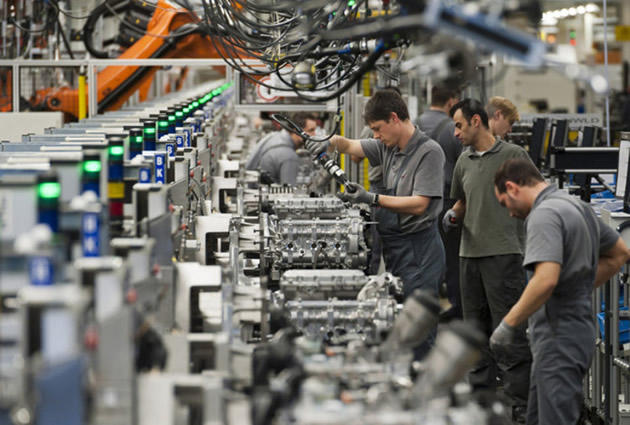Euro-Area factory production accelerates

 Zurich
Zurich
Euro-area manufacturing expanded for a fifth month in November, as Germany continued to drive the 17-nation currency bloc’s gradual recovery from a record-long recession. A factory index rose to 51.5 from 51.3 in October, London-based Markit Economics said today. That’s in line with the median forecast in a Bloomberg News survey of 37 economists. A reading above 50 indicates expansion. Markit’s services gauge unexpectedly fell to 50.9 from 51.6, while a separate Chinese manufacturing index declined for the first time in four months.
Euro-region economic growth cooled in the third quarter and the European Central Bank cut its main refinancing rate to a record-low 0.25 percent on Nov. 7, based in part on its forecast for “continued, albeit modest, growth in the second half of the year.” ECB President Mario Draghi said a “gradual strengthening of demand for exports” should contribute to growth.
“Some encouragement must be gleaned from the PMI signaling expansion of the euro-zone economy for a fifth successive month in November, but the average reading over the fourth quarter so far is signaling a very modest 0.2 percent expansion,” said Chris Williamson, chief economist at Markit. “And it looks like momentum is being lost again.”
Export Growth
The euro-area economy grew 0.1 percent in the three months through September after expanding 0.3 percent in the previous three months.
Economists in a separate Bloomberg survey see gross domestic product rising 0.2 percent this quarter and 0.3 percent in the first three months of 2014. Exports increased 1 percent in September to 158.5 billion euros ($214 billion) after a 0.4 percent gain in August.
Germany, Europe’s largest economy, drove the euro-area expansion in November, with Markit’s manufacturing gauge rising to a 29-month high of 52.5 and the services index at 54.5, the highest in nine months, according to a separate report today.
At the other end of the scale, France, the euro area’s second-largest economy, saw manufacturing output slip to a six-month low.
France “showed further signs of being the ‘sick man of Europe’ with output showing a renewed decline and raising the risk that GDP could fall again in the fourth quarter, constituting a renewed recession,” Williamson said.
U.K. ‘Booming’
A UK report today showed manufacturing orders rose at the fastest pace in almost two decades in November. The Confederation of British Industry’s orders index increased to 11, the highest since March 1995, from minus 4 in October. That exceeded economists’ forecast for a reading of 1. An index of output expectations rose to 24 from 9.
“This strong reading fits in with other surveys which suggest that the U.K. economy is booming,” said Michael Saunders, an economist at Citigroup Inc. in London. “We expect real GDP growth of 3 percent for 2014, but this and other surveys suggest that risks lie to the upside.”
In China, a manufacturing gauge declined for the first time in four months, adding headwinds to a recovery in the world’s second-largest economy as leaders start to implement the broadest policy reforms since the 1990s.
Slower manufacturing gains would add challenges for Premier Li Keqiang in carrying out a reform package that includes loosening controls on interest rates and giving farmers more land rights. Expansion headwinds may intensify after last month’s slowdown in credit growth that suggests Li is trying to contain financial risks.
Markit releases its initial November report on U.S. manufacturing (ECONMUS) at 2 p.m. in London.
Auto Sales
The encouraging news in Europe was reflected in the long-suffering automotive industry, as new car sales rose in October for a second month for the first time since 2011. Registrations increased 4.6 percent from a year earlier to 1.04 million autos.
European sales at Wolfsburg, Germany-based Volkswagen AG, the region’s biggest carmaker, rose 5.7 percent in October, propelled by jumps of 24 percent at the Skoda brand and 15 percent at the Seat nameplate, while registrations gained 1.4 percent at the namesake VW marque.
Renault, based in the Paris suburb of Boulogne-Billancourt, posted a 16 percent European sales gain at the entry-level Dacia brand, which has revised the Sandero hatchback and Logan sedan. Registrations at the main Renault marque rose 13 percent.
Still, the euro area continues to struggle with the legacy of a debt crisis now in its fifth year, with unemployment at a record 12.2 percent.
Industrial production slipped 0.5 percent in September. Annual inflation slowed to 0.7 percent in October, the lowest level in nearly four years.
“Europe is at risk of having a similar situation as Japan had in the 1990s: very slow growth — economic stagnation — and deflationary pressure,” Joachim Fels, co-chief global economist at Morgan Stanley, said on Nov. 13. -Bloomberg








Comments